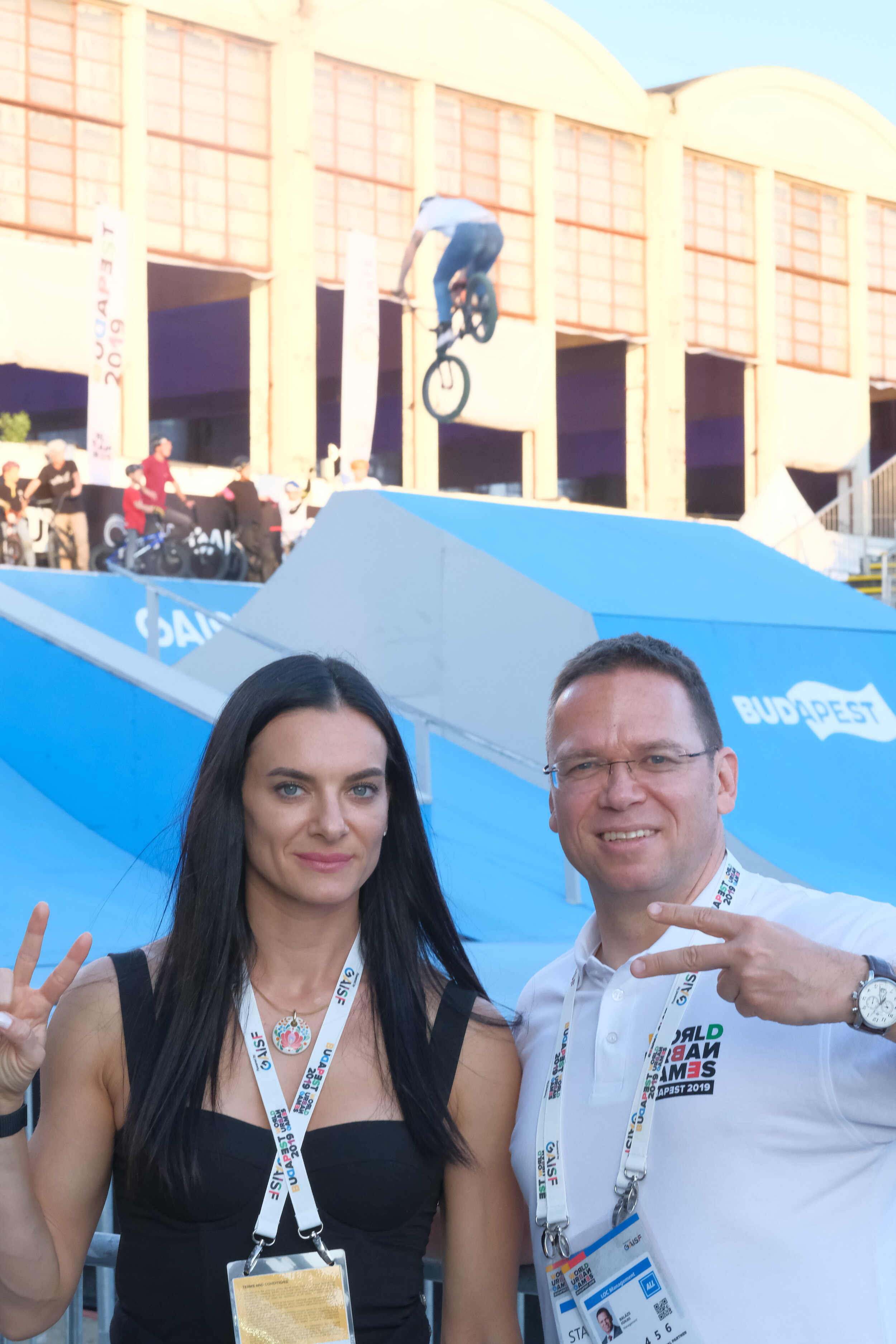BUDAPEST — Journalists are incessant what-ifers and how-abouters. And here was Balázs Fürjes, who oversaw the Budapest bid for the 2024 Summer Games and is an increasingly influential and important personality in the Olympic movement, briefing a bunch of journalists on a spectacularly sunny Friday as the first events of the World Urban Games got underway.
The topic: Budapest as — like Fürjes — increasingly influential and important player in the Olympic scene.
Consider: 2017 FINA swim championships, widely acknowledged as best-ever. Coming up for sure: 2023 IAAF track and field championships and (back again) 2027 FINA champs. Keen interest in: 2025 FIG gymnastics championships. Along with so much more, including this inaugural edition of WUG, with roughly 300 athletes from 48 nations across five continents.
Yelena Isinbayeva and Balazs Fürjes at the World Urban Games BMX Freestyle venue // photo by ODPictures
WUG, a combo sport, music, art and street culture festival anchored by a huge graffiti-decorated warehouse on the city’s southern end, has stoked keen interest from the International Olympic Committee in the aftermath of last year’s transformative Youth Olympic Games in Buenos Aires.
Given all that, what was the obvious question? Indeed, it came up pretty darn quick: is Budapest in the game for another Olympics?
The IOC has recently thoroughly revamped its entire way of choosing cities, and it would appear that Brisbane has the inside track for the next available Summer Games in 2032, the senior Australian IOC member John Coates a trusted ally of the IOC president Thomas Bach, among other factors, and on this glorious Friday Fürjes was quick to say — news alert — that Budapest is all but out for 2032, declaring it’s “currently not on the agenda,” adding that 2032 “will go to Brisbane, that’s my bet.”
Beyond, 2036 and 2040 are a long, long way off.
Any common-sense, rational assessment would say Budapest would present a case for the Games that would and should be taken exceptionally seriously; that was the instance for 2024. Hungary, for instance, is a top-10 medal-winning Summer Games nation. Fan support for Olympic-style support here is, in a word, avid; at the 2017 FINA championships, the roar for water polo at the venue in Margaret Island, in the middle of the Danube River, reverberated across Pest and up and around Buda.
Yelena Isinbayeva, the Russian champion who is now an IOC member, dropped in late Friday to the WUG media center to, one, reiterate she would have won the Rio 2016 pole vault competition (she was barred from competing because of the Russian doping ban) and, two, declare Budapest the “European sport capital of the future.”
Of Budapest, Isinbayeva said, it’s a “beautiful, wonderful city full of tourists.” No argument there. She can take up the Rio matter with winner Katerina Stefanidi of Greece.
Meanwhile, looking out to 2036 — who can conjure up an Olympics that far away?
As for 2040, 21 years from now?
How can that possibly, right now, be anything but — hang on, we’ve got breakdancers and BMX riders to look after this weekend at the World Urban Games and then a lot of other stuff to attend to, and maybe if the time and conditions are right, then that conversation can be had but, right now, come on.
It’s why the sensible — the logical — strategy for Budapest is a focus on what Fürjes called being one of the “three most important sport capitals of Europe,” which in turn involves bidding for sports events, games and conferences to and through 2030.
Budapest, he said, is in a group with — or surely ought to be thought of along with — London, Paris, Moscow and Berlin. Those, he said, are the “top global sport capitals in Europe.”
Fürjes, Hungary’s secretary of state for development and international sport events, said, “The Olympics is a fantastic thing — but will we ever have it? I don’t know.
“Even without the Olympics, there are so many opportunities in sport and these events are useful for the city,” for branding, tourism and more.
When asked about lessons learned from the 2024 effort, which came to an abrupt end in March 2017, Paris and Los Angeles being awarded 2024 and 2028 in the IOC’s historic double-double in September of that year, Fürjes offered a lengthy answer that ought to serve as a model for anyone anywhere who might now consider an Olympic campaign.
The primary lesson, he said, is the need to first be an established sport city — to be a global player like Tokyo (2020 Games), Paris (2024) and LA (‘28).
Then, he said, “Cities have a chance with the Olympics now only if they can present themselves as a very safe choice,” and by “safe” he had a very distinct interpretation:
“That means the city almost being ready the next day to host the Olympic Games,” which itself means the needed infrastructure is on the ground, because in turn that means no capital costs to sell to taxpayers.
It’s the only way, he made clear.
“If you look at the choices the [IOC] is making, they are very secure. Security and stability is the driving force and I fully understand that.
“Any city should only think of bidding for the Olympics once they are fully ready,” Fürjes said. “They are a nice thing to have.
“So maybe one day.”


